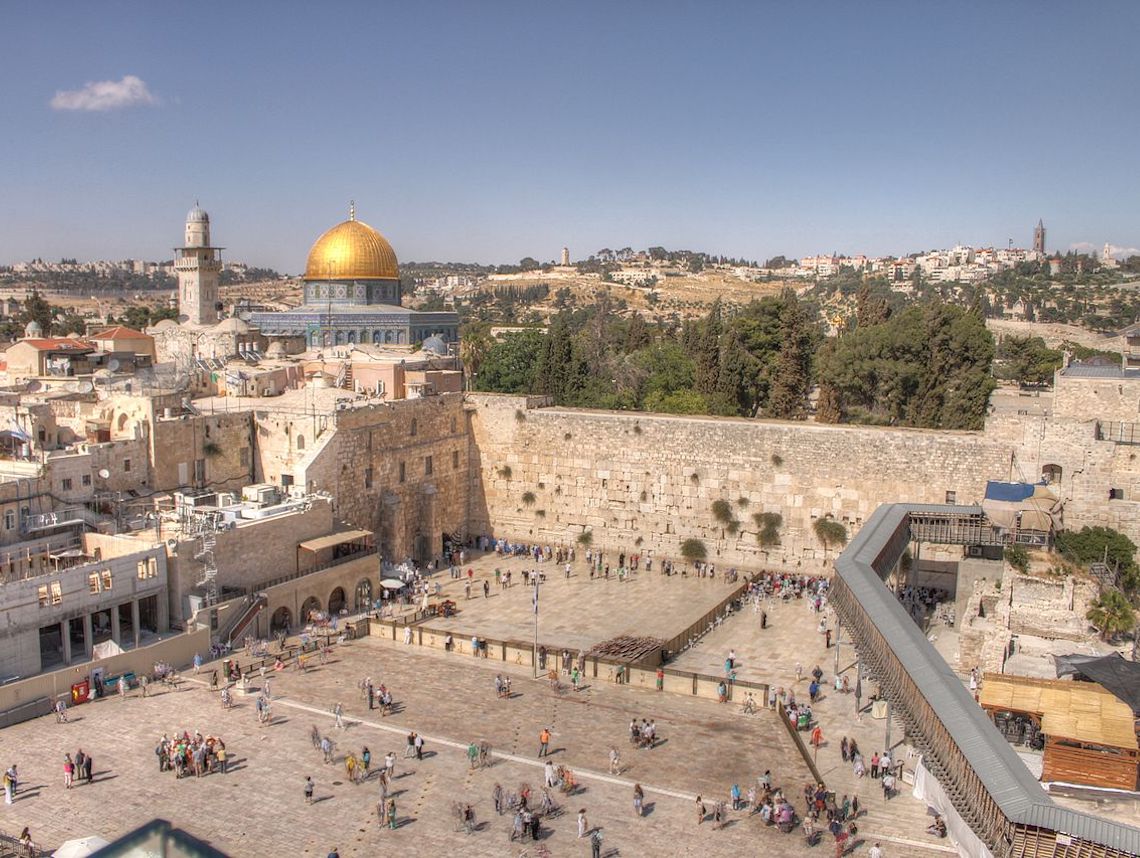 The Western Wall and Dome of the Rock in the old city of Jerusalem. Photo via WikiCommons
The Western Wall and Dome of the Rock in the old city of Jerusalem. Photo via WikiCommons In 1967, when Israeli paratroopers stormed the Old City of Jerusalem and commander Mordechai “Motta” Gur proclaimed, “Har HaBayit BeYadeinu (the Temple Mount is in our hands!)” — the Six-Day War had reached its historic and emotional climax.
“The events of 1967 did for Judaism what 1948 did for Jewish nationalism,” B’nai David-Judea Rabbi Yosef Kanefsky said during the Shalom Hartman Institute’s Six-Day War conference.
The reunification of Jerusalem and the assertion of Jewish religious primacy there “returned Judaism to the stage of world history,” he said.
For the first time in two decades, the Jews had regained access to their holiest sites — including the Temple Mount and the Western Wall — and brought a “reunified” Jerusalem under their control for the first time since the destruction of the Second Temple in 70 C.E.
But a Jewish-controlled Jerusalem came with a price: East Jerusalem, the location of the holy sites, was an Arab-majority neighborhood. And the Temple Mount — where Jews believe the world began, where the first human was created, and where Abraham bound his son Isaac — also happens to be one of Islam’s holiest sites.
Known in Arabic as Haram esh-Sharif, the Temple Mount is home to the al-Aqsa Mosque and the Dome of the Rock, and is the place Muslims believe the Prophet Muhammad ascended to heaven on the Night Journey. It is considered the third-holiest site in Islam after Mecca and Medina.
While Jews have made the Western Wall the focus of their prayer life, the Temple Mount remains the most contested holy site in the world. And yet, it is only one aspect of a larger quarrel over Jerusalem, in which Christians also have a stake: Jesus Christ arrived in Jerusalem to preach his message to the masses, and, according to Christianity, was crucified, resurrected and ascended to heaven from there.
Throughout history, the “City of Peace” also has seen violent discord. Even as Jerusalem remains under Israeli control, efforts to discount one another’s claims to the city persist.
Before the anniversary of reunification, I asked Israeli tour guide Michael Bauer why Jerusalem remains a quandary. He identified several areas that explain, at least in part, the gaps separating the aspirations of each faith tradition and the reality of political Jerusalem.
Knowledge: Both within Israel and the Palestinian territories, there is a concerted effort to teach identity-building, nationalistic versions of history that do not leave room for learning about other faiths or alternative perspectives.
“I’m shocked when I see kids finishing high school and they literally don’t know anything about Christianity, which is, in a way, part of our history and part of our surroundings,” Bauer said. “I also teach the Palestinian narrative in a pre-army program, and if I don’t do that, no one does it. I’m always shocked at the lack of knowledge.”
The same is true of Palestinians: Most are not taught about Jewish religious and historical claims to the land, leaving both sides mostly ignorant of the other’s place there.
Emotion: “Jerusalem is where all the emotions are,” Bauer said. “For things to get better in Jerusalem, things need to be solved around Jerusalem.”
After 1967, Bauer pointed out, Arab Muslims were humiliated at losing control of Jerusalem, a defeat made worse by the fact that they had to pass through Israeli security checkpoints to visit their holy sites. Until their dignity is restored through political compromise, Jerusalem remains a proxy for conflict.
History versus faith: “When you walk in Jerusalem, you’re looking at stories which for one person is history and for another is faith,” Bauer said. “If I say the words ‘Jesus,’ and ‘resurrected,’ one person in front of me has heard not only a fact but maybe one of the most important facts of his life, because to believe in resurrection is a fact that defines his Christianity. But for a Jew or Muslim, they’ve heard something that they think is just not true.”
Historical and spiritual claims are equally fraught in a place that encompasses both.
Human frailty: “Religion is not the problem in Jerusalem. The problem is people,” Bauer said. “They don’t know how to get along with ‘the other’ too well. And in Jerusalem, there are a lot of ‘others’ in one small place. As long as people do not know how to live with someone different, Jerusalem will be challenged.”
This pretty much explains why we need religion in the first place.
But let’s face it: Except for periodic skirmishes and flare-ups, and the intrareligious conflicts that plague all three faiths’ holy sites, Jerusalem has been in pretty good hands since ’67.
“Most days, it works,” Bauer said. “It depends what you want to focus on. You can choose to see a reality that is very conflicted. Or you can take another look, walk the same route in a different mood, and you will see coexistence.”
A historian, Bauer prefers to look at the precedents of the past rather than predict the future.
“Through everything that has happened over 3,000 years, there were eras of stability,” he said. “Last year was terrible in Jerusalem; there were stabbings all the time and al-Aqsa was a horrible place to visit. There were kids and women yelling at every Jew that went up there, singing songs, ‘With blood we will redeem Palestine.’ But it’s not happening there now. It’s a different Jerusalem from last year. It’s like a roller coaster. Things get better and then they get worse again.”
Danielle Berrin is a senior writer and columnist at the Jewish Journal.






















 More news and opinions than at a Shabbat dinner, right in your inbox.
More news and opinions than at a Shabbat dinner, right in your inbox.